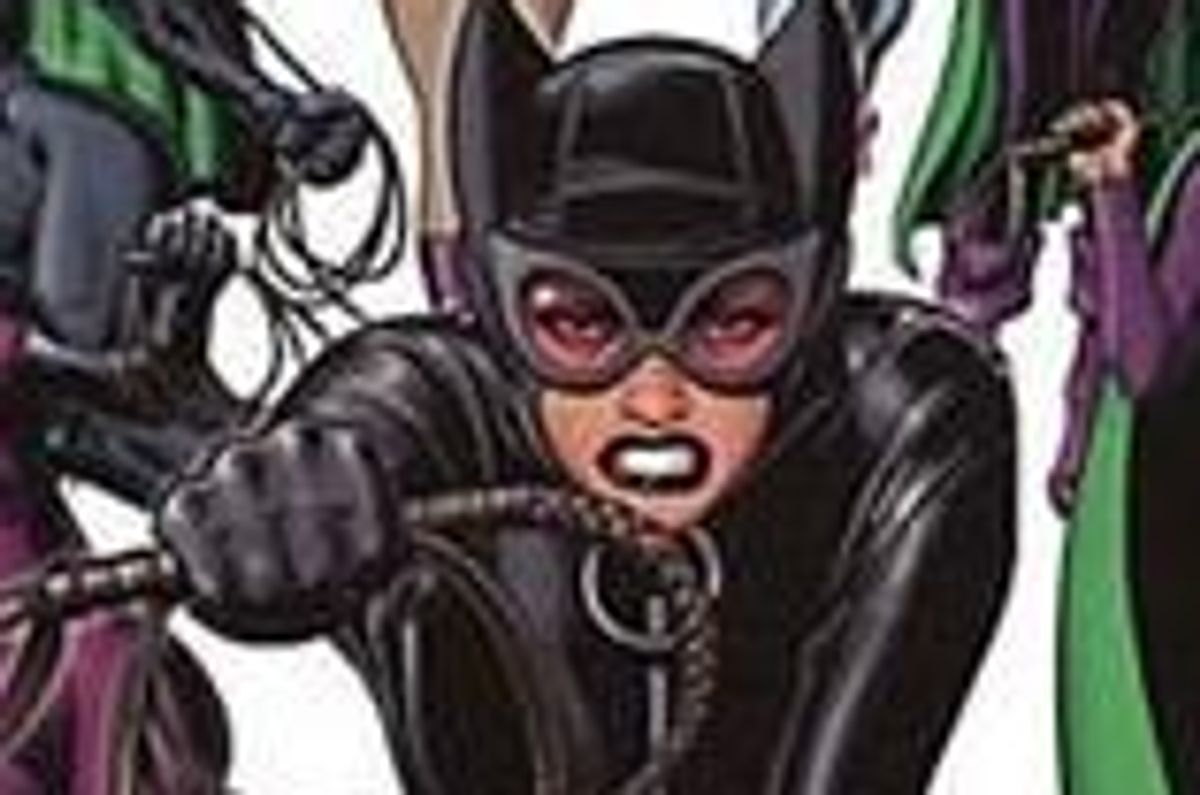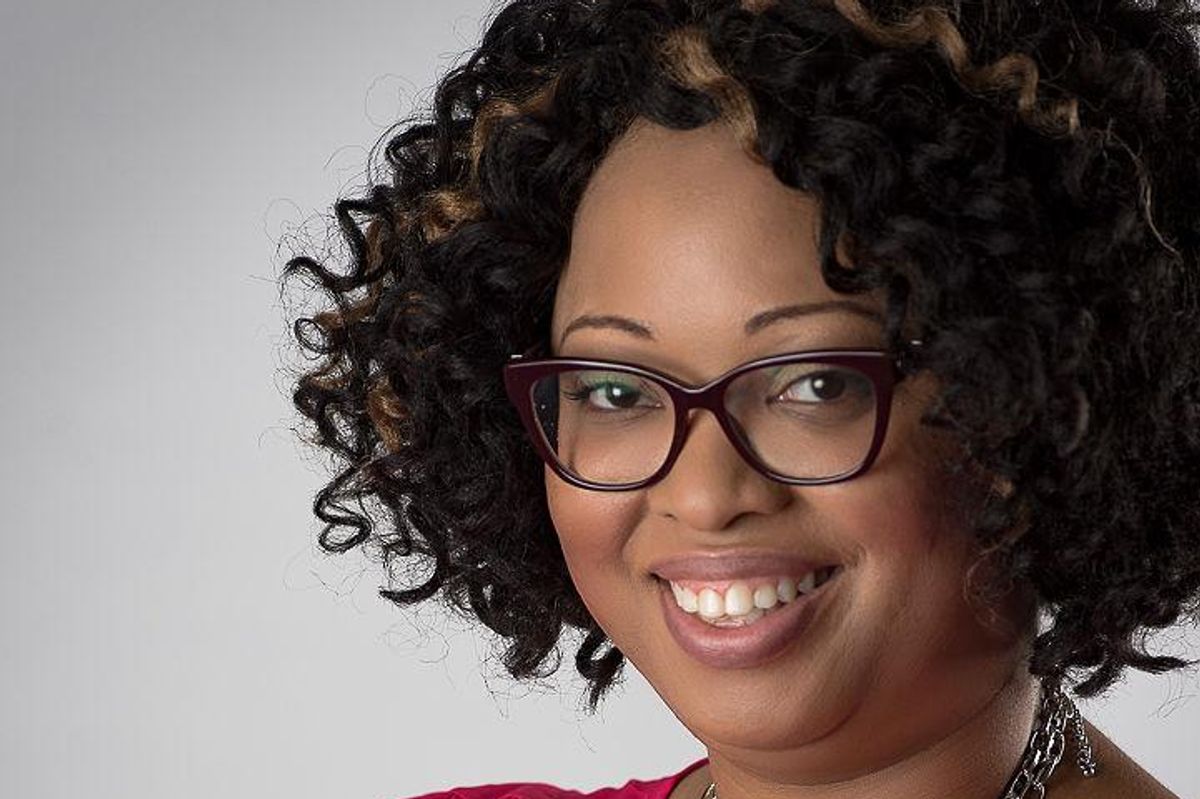From Kitt to Kravitz–how actresses of color are claiming Catwoman for Black feminism

Cover of "Catwoman: Nine Lives of a Feline Fatale."
Selina Kyle, aka Catwoman, is a quintessential Batman villain … slash accomplice … slash on-again-off-again love interest. But outside of her relationship status with Bruce Wayne, Catwoman is a fascinating character in her own right.
Agile, clever, dangerous, independent—selfish even—yet still a consistent champion for the disenfranchised. She has no loyalty to the status quo and plays by her own rules. She never really needs a hero, because she acts as her own savior.

She has all these fascinating layers, and as a Catwoman fan I find it tragic that often in film adaptations, this character is portrayed in one of two ways: either as a sex object or as a foil to the main (male) hero.
However, two actresses of color—Zoë Kravitz and Eartha Kitt before her—transcend the tropes and embody Catwoman’s essential qualities, each in their own distinctly masterful way. Because of their boldness, Catwoman is not only a more dynamic character, she’s a compelling symbol for Black female empowerment.
To geek out a little further on the subject, I spoke with Jamie Broadnax of Black Girl Nerds, a blog turned multimedia outlet that explores all things at “the intersection of geek culture and Black feminism.” Who better to team up with, right?

Together, we explored the social impact both Kitt and Kravitz portrayal had on everyone’s favorite feline fatale.
(For the sake of this article, we’ll just pretend that one "Catwoman" movie never existed. Though I still stand for Halle Berry.)When Eartha Kitt became the first black Catwoman back in 1967, she knew its importance. Her daughter Kitt Shapira told Closer Weekly:
“I was about nine years old when she played Catwoman on Batman, and that was a really big deal. This was 1967, and there were no women of color at that time wearing skintight bodysuits, playing opposite a white male with sexual tension between them! She was one of the first really beautiful black women — her, Lena Horne, Dorothy Dandridge — who were allowed to be sexy without being stereotyped. It does take a village, but I do think she helped blaze a trail.”
 Tv Show Vintage GIFGiphy
Tv Show Vintage GIFGiphyAnd blaze she did. Eartha Kitt purred her way into legend, giving the character an iconic voice, feline mannerisms and downright fierce femininity. Whenever she came on screen, it felt like something between edgy performance art and a civil rights protest.
In one particular Batman episode titled “Catwoman's Dressed to Kill,” the character infiltrates a posh luncheon ceremony filled with white socialites, ready to give Batgirl an award for being the best dressed crime fighter. But Catwoman ain’t having it.
Gesturing to the table of white female socialites, she hisses “You ladies, with your fancy hairdos, what do you know about beauty?” before throwing dust that explodes and turns their hair into afros.” It was a pretty radical way to comment on white-leaning beauty standards, if you ask me.
Before Eartha, the role was played by the famously “statuesque” Julie Newmar. And though Newmar gave a wonderfully wistful, slinky innocence to the role, there is something about Kitt’s portrayal that feels more pivotal. More important.
Like Newmar, Kitt definitely had sex appeal, but in a way that empowered other Black women to see themselves in the same light.
Jamie Broadnax:“Eartha Kitt molded Catwoman into a sex symbol, which was certainly appealing for the time. She served a purpose of being a beautiful antagonist for Batman, while Batman was conflicted himself with her beauty and was enamored by it. Eartha Kitt also allowed Black women like me to see themselves reflected in TV shows (especially genre TV shows) that allowed us to believe that we, too, can be Catwoman. It's also because of Kitt's Catwoman that many Black women felt comfortable cosplaying as the character.“
Fast forward to 2022, and now Zoë Kravitz is getting acclaim for her equally striking version of Selina Kyle. Everyone from Taylor Swift to OG Catwomans (Catwomen?) Halle Berry, Anne Hathaway and Michelle Pfieffer have sent their heartfelt praises.
This Catwoman is sexually fluid, stealthy AF, resourceful and cunning, with charisma and depth. Like Kitt before her, Kravitz offers an emotional equal to Robert Pattinson’s Batman. It makes for some fantastic viewing, even to those who could care less about The Batman and his conquests.
 Robert Pattinson Couple GIF by The BatmanGiphy
Robert Pattinson Couple GIF by The BatmanGiphyBroadnax adds:
“She's fully fleshed out and gives proper motive for her actions in a way we haven't seen before. By that I mean, she's not a self-serving anti-hero as depicted in other films, but instead is more of a heroine to those close within her sphere of influence.”
This might seem like a small feat for Kravitz, who is no stranger to producing great work. But keep in mind: Even an A-list, award-winning actress like Kravitz, born into celebrity, still faces obstacles because of the color of her skin.
In an interview with The Guardian, Kravitz revealed that she had previously been refused a chance to audition for a role in "The Dark Knight Rises" for being too “urban.”Previously, sources thought Kravitz wasn’t allowed to audition for the role of Catwoman (which went to Anne Hathaway). That has since been proven untrue, but even if it were, considering that Catwoman only appeared for a total of 19 minutes in “The Dark Knight Rises,” I’d say it was a blessing in disguise.
Taking the blatant racism aside, as a comic book nerd, this is just mind-boggling. Have you seen Gotham? That’s about as urban as it gets. But I digress. It’s an insidious and ugly word that Hollywood has been allowed to hide behind for far too long. Plain and simple.
Kravitz added, “Being a woman of color and being an actor and being told at that time that I wasn’t able to read because of the color of my skin, and the word urban being thrown around like that, that was what was really hard about that moment.”
For Kravitz to not only play the role, but to shine in it, helps other Black women see that times are changing. Not saying they’re changing fast enough, but still. Once again Catwoman has become a role model for confidence and power. For those who are often lacking positive representation, this can be vital.
What will be next for Catwoman? The future is still unwritten. Broadnax and I both agreed that when it comes to Kravitz, we’re hoping for a standalone series. But either way, because of the courage of trailblazing performers, Catwoman will be forever changed. She may be considered a nemesis to Batman, but when it comes to Black feminism, she’s a hero.
By the way, if you’d like to see Jamie Broadnax's full review on "The Batman," you’re in luck! That can be found here.
- A Black woman came out of surgery with more braids than before ... ›
- Erin Jackson becomes first Black woman to win Olympic ... ›
- 10 things you may not know about black women but definitely ... ›






 A woman is getting angry at her coworker.via
A woman is getting angry at her coworker.via  A man with tape over his mouth.via
A man with tape over his mouth.via  A husband is angry with his wife. via
A husband is angry with his wife. via 
 Curling requires more athleticism than it first appears.
Curling requires more athleticism than it first appears.
 a man sitting at a desk with his head on his arms Photo by
a man sitting at a desk with his head on his arms Photo by  Can a warm cup of tea help you sleep better? If you believe it, then yes. Photo by
Can a warm cup of tea help you sleep better? If you believe it, then yes. Photo by 

 Comfort in a hug: a shared moment of empathy and support.
Comfort in a hug: a shared moment of empathy and support. A comforting hug during an emotional moment.
A comforting hug during an emotional moment. Woman seated against brick wall, covering ears with hands.
Woman seated against brick wall, covering ears with hands.